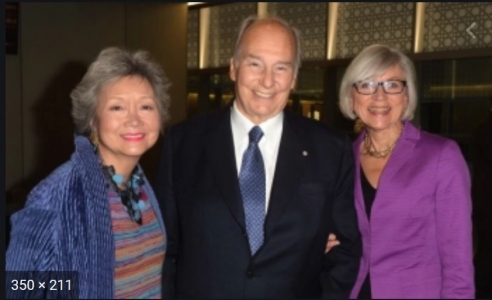Introductory Remarks by H.H. The Aga Khan at the Annual Pluralism Event at the Aga Khan Museum 2015-05-28
Annual Pluralism Lecture 2015
Introductory Remarks
His Highness the Aga Khan
Toronto, Canada – May 28, 2015
Bismillah-ir-Rahman-ir-Rahim
Chief Justice Beverley McLachlin
Madame Adrienne Clarkson
Your Excellencies
Ministers
Distinguished Guests
Ladies and Gentlemen
Chers amis, permettez moi de vous souhaiter la bienvenue à la quatrième Conférence annuelle
sur le pluralisme que nous avons le plaisir d’organiser pour la première fois au Musée Aga Khan
de Toronto. Ces conférences offrent une plateforme unique pour le dialogue international et
soulignent le leadership de ceux et celles qui font une différence concrète en faveur du
pluralisme et de la citoyenneté inclusive. Nous avons l’immense honneur d’accueillir
aujourd’hui, la juge en chef du Canada, qui partagera ses réflexions sur les défis et les
perspectives du pluralisme au 21 e siècle.
I am delighted to welcome the Right Honourable Beverley McLachlin to deliver the Global
Centre’s fourth Annual Pluralism Lecture and to welcome you all to the Aga Khan Museum.
The Chief Justice is a great champion of pluralism, with a wide range of judgements that
demonstrate a profound respect for inclusion and accommodation.
As you may know, she also made history in the year 2000, when she was the first woman to be
appointed Chief Justice in Canada – you understand the hint about gender issues – and in 2013,
when she became the longest serving Chief Justice of the Canadian Supreme Court.
When the Chief Justice first came to the Supreme Court in 1989, The Canadian Charter of Rights
and Freedoms had recently come into force. The justices were hearing numerous controversial
human rights cases and often rendering divided decisions.
But the Chief Justice’s appointment ushered in an era of consensus building among her colleagues. Through her thoughtful, articulate leadership, she has reinforced respect for the Supreme Court, while also fostering greater public understanding about the justice system.
By working to uphold the rights of all Canadian citizens, the Chief Justice has contributed in a major way to Canada’s robust pluralism. Certainly, Canadians will insist that there is still work to be done. But on the world stage, there is a great need for experiences of pluralism that work and Canada is providing a powerful example.
In her LaFontaineBaldwin lecture in Toronto in 2003, the Chief Justice said and I quote, “One problem, more than any other, dominates human history – the problem of how we deal with those who are different than us.”
Those words have sharp, continuing relevance as we move further into the 21 st century. Whether the challenge involves new waves of migrants moving into European societies, or political participation for the indigenous peoples of Latin America, or working towards democratic change in the Middle East and North Africa, there is a profound need to focus on the values and hopes that unite all human beings.
As the Chief Justice has stated and I quote again, “The creation of a harmonious society where every individual feels not only accepted but truly welcome is the responsibility of all citizens.”
This responsibility is why the Global Centre for Pluralism exists to help us learn from one another about the challenges of diversity. And on evenings like this, we are fortunate to realize the Centre’s mission to convene change leaders and inspire dialogue about the benefits of inclusion and respect.
Ladies and Gentlemen, together with you, I eagerly look forward to hearing from the Centre’s honoured lecturer for 2015, the Right Honourable Beverley McLachlin
- 9598 reads
 Ismaili.NET - Heritage F.I.E.L.D.
Ismaili.NET - Heritage F.I.E.L.D.